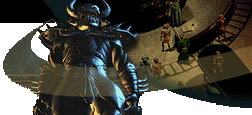Multiplayer Troubleshooting
This page describes possible solutions if you are having trouble with connecting to or running a multiplayer game.
Multiplayer officially requires 32 MB of RAM although it will run with only 16 MB.
Poor network card drivers are a major source of game crashes or lock ups. Especially problematic is the Realtek 2089 driver that shipped with Windows 98. Much improved drivers for this card can be downloaded here. Poor drivers for a network card will crash everyone playing the game not just the computer that contains the card.
Baldur's Gate will sometimes display a "Connection Failed" message
when you are attempting to connect and are suffering from slow ping
times. This could happen as often as 1 in 4 times if your ping time
is greater than 500 ms. Try again and you will connect.
During Game Creation or Area Loading do not use Alt-Tab to minimize Baldur's Gate as this may cause the game to either hard lock or terminate. In a multiplayer game, if the host is controlling more than one character(s), and Alt-Tabs during an area transition, the secondary character(s) will not appear until the host restores the game. This cannot be resolved as the character data cannot be transferred to other game machines if the host machine is not active.
Firewalls are not compatible with DirectPlay 5, the networking code used by Baldur's Gate. DirectPlay 5 randomly determines the UDP port Baldur's Gate uses making it difficult to circumvent. Once a TCP/IP game is in progress, Baldur's Gate uses port 1470 to communicate information to GameSpy clients. For a technical discussion of ports, refer to this post by Darth Maul, which only appears to be relevant to Windows 98. Downloading the latest version of Winsock 2.2 may be useful for Windows 98 users.
Winsock 1.1 (the base version that ships with Windows 95) has proven to be a problem for some people playing multiplayer. It is highly recommended that users that do not have Winsock 2.0 install it if they are playing multiplayer with the patched version. Make sure that all people playing the game have upgraded to Winsock 2.0. This may be especially useful for those with an internet connection through a Proxy Server. Winsock 2 for Windows 95 can be found here, while it should already be installed in Windows 98.
All the protocol buttons being grayed out (eg. IPX, TCP/IP, etc.) indicates that DirectPlay 5 (or later) has not been installed on your system. Installing DirectX 6.0 from the Baldur's Gate CD1 should fix this problem. DirectX 6.1 is available at Microsoft.
You may experience lag if all players do not use the same AI speed setting, or the selected setting is too fast for the slowest computer. Enter the BGConfig program and adjust the speed (default is 30 AI Updates/second).
With Windows NT, Baldur's Gate requires that you have installed Service Pack 4 (SP4) to play multiplayer. SP4 includes DirectPlay 6 support on top of the inadequate DirectX 3 support found in SP3. Slow downs during gameplay have been reported under NT. These are due to the way that Direct Sound and the System Timers interact. This may be corrected in future version of NT.
There have been some problems with dial-up internet connections and
multiplayer games. If you are finding you cannot connect to other
multiplayer games, add the following line into the baldur.ini file
located where you installed the game:
under -->
[Multiplayer]
add -->
AsyncEnumeration=1
|
During installation [of Tales of the Sword Coast], two Winsock 2.0 .dll files are copied onto your hard drive
if you are running an Operating System that does not have Winsock 2.0 installed.
These files are only used if you are using TCP/IP. If you would like to use
any TCP/IP Winsock 2.0 applications and you do not have TCP/IP installed, you will
have to reinstall Winsock 2.0 after you have installed TCP/IP in order to use the
TCP/IP protocol.
If you encounter any problems with Modem Play, please try re-installing
DirectX 6.1.
|

